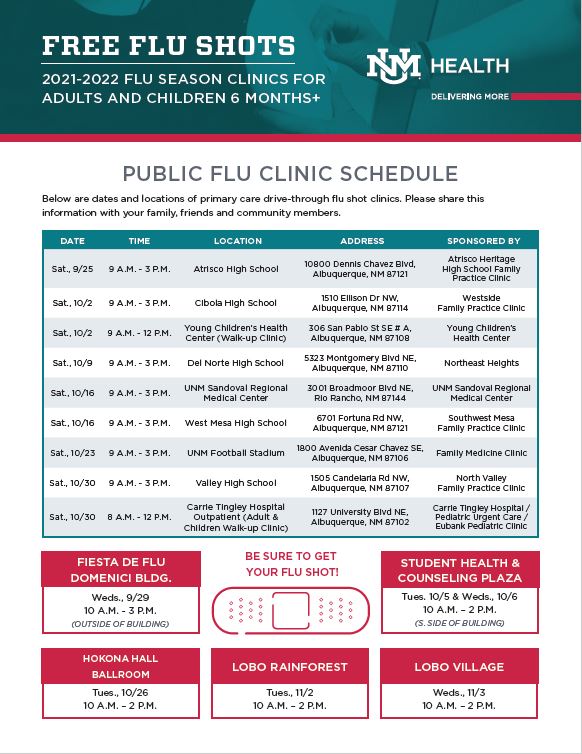Preparing for Disaster: UNM Hospital Participates in Region-Wide Emergency Training

Free Flu Shots
UNM Health Holds Drive-Through Clinics in Albuquerque, Rio Rancho
Last year’s flu season was basically nonexistent, due to most people staying home and masked while shopping or in a public place to prevent the spread of COVID-19, but this year’s cold and flu season will likely be very different.
“We’re already seeing RSV cases, and those usually don’t appear until January,” says Meghan Brett, MD, epidemiologist for The University of New Mexico Hospital. RSV – respiratory syncytial virus – is a respiratory virus that can cause serious illness in infants and older adults, according to the Centers for Disease Control and Prevention.
“I think part of the challenge is that we have opened up since then,” Brett says. “But I know that fatigue is setting in, too. I also know that people want to see family and friends. And I think that puts us at risk for any respiratory virus – COVID, flu, RSV or otherwise.”
That’s why UNM Health is holding several free drive-through flu shot clinics for everyone six months and older beginning Sept. 25 and ending Oct. 30. The clinics will be held in large parking lots at high schools, stadiums and health centers around the metro area.
“I think anything that can help reduce your risk for developing symptoms of any respiratory virus, or preventing things like clinic visits or being in the hospital, is strongly recommended,” Brett says.
UNM Health is holding numerous clinics to make the flu vaccine widely accessible, she says. “I think the barriers around getting people vaccinated should be incredibly low, so I think there's been an effort to make it as accessible as possible.”
Though symptoms of flu and COVID are similar – runny nose, sore throat, cough and fever – the one thing that sets them apart is the loss of taste and smell, which occurs in a COVID infection. “That’s why I think testing is important to figure out which infection you may have,” she says.
Providers can prescribe medications such as Tamiflu for the flu, and monoclonal antibodies for COVID for people with underlying health conditions, she says.
In addition to getting vaccinated, wearing a face mask and good hand hygiene can prevent the spread of the flu and COVID-19 this cold season.
